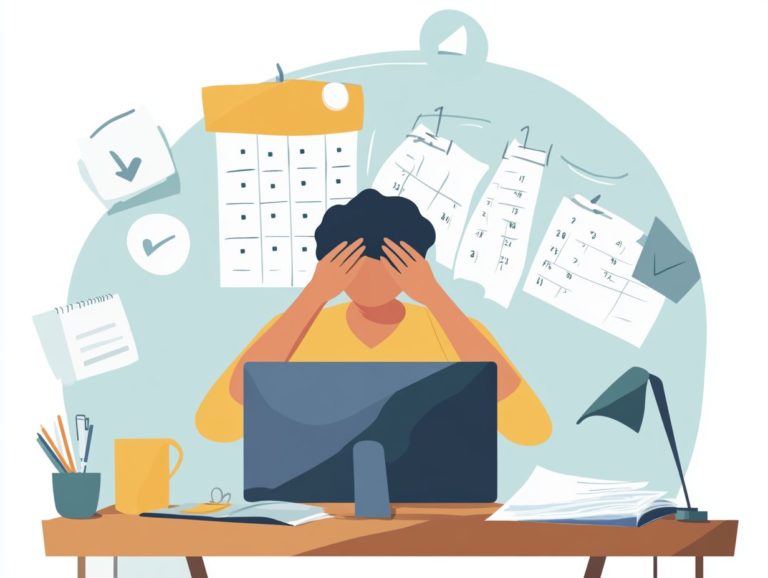Common Mistakes in Auto Claims and How to Avoid Them
Navigating the realm of auto claims can be a challenge, but you can master it! Understanding what auto claims entail and identifying common pitfalls can significantly enhance your experience.
Many drivers inadvertently undermine their claims by neglecting to report accidents or supplying inaccurate information.
This article highlights these frequent missteps and presents practical steps to help you sidestep them. By staying informed and taking a proactive stance, you can facilitate a smoother claims process and safeguard your rights!
Contents
- Key Takeaways:
- Understanding Auto Claims
- Common Mistakes in Auto Claims
- How to Avoid These Mistakes
- Frequently Asked Questions
- What are some common mistakes people make when filing an auto claim?
- How can I avoid making these mistakes?
- What should I do immediately after a car accident?
- What information should I provide to my insurance company when filing a claim?
- Can I file an auto claim if I am at fault for the accident?
- What should I do if my auto claim is denied?
Key Takeaways:
Understanding Auto Claims
Understanding auto claims is vital for navigating the insurance world after a car accident. It involves a claims process to secure fair compensation for injuries and vehicle damage.
When an accident happens, report it to your insurance company promptly. This not only speeds up your claim but also clarifies who is at fault.
Document everything carefully. Keep medical records and evidence from the accident scene. This will greatly impact the decision-making process and your final compensation.
What are Auto Claims?
Auto claims are formal requests you make to your insurance company for compensation after a car accident. They cover personal injury and vehicle damage expenses.
These claims link you, the driver seeking financial relief, to the insurance provider that assesses the validity and extent of the damages incurred. When you file a claim, the insurance company will begin an investigation that typically involves gathering statements, photos, and repair estimates.
Different types of auto insurance come into play, including liability coverage (protection against costs if you re at fault), collision coverage, and comprehensive insurance. Each offers unique levels of protection tailored to your needs.
The claims process is significant not just for you as the claimant seeking reimbursement, but also for the insurer, as it helps them gauge risk, manage payouts, and uphold the overall integrity of their insurance portfolio.
Common Mistakes in Auto Claims
Navigating the auto claims process can present a host of challenges. Avoiding the 7 biggest mistakes in auto insurance is crucial, as common missteps can result in claim denials or diminished compensation.
It s essential for you to recognize pitfalls like failing to report accidents promptly or neglecting to gather thorough documentation. Understanding these factors can significantly enhance your chances of a successful claim.
Failure to Report Accidents
Failing to report accidents promptly can complicate your insurance claims process and lead to potential claim denials. Insurance companies depend on timely reporting for effective claim management, and any delay can create unnecessary hurdles.
Neglecting to report an accident quickly not only complicates the claims process but may also expose you to legal liabilities. Delays in notifying your insurance provider can create gaps in documentation, making it challenging to establish the facts of the incident. Insurers might interpret this delay as a sign of bad faith or a lack of transparency, jeopardizing your claim’s legitimacy.
Many jurisdictions impose legal obligations to report accidents within a specific timeframe. Ignoring these regulations could lead to penalties or fines, further complicating the issues arising from inadequate reporting.
Providing Inaccurate Information
Providing inaccurate information during the claims submission process can have serious repercussions. These include delays in decision-making and the risk of your claim being denied altogether.
Errors like misreported damages, incorrect policy details, or overlooked timelines can quickly escalate. This complicates what should be a straightforward process. Insurers depend on thorough and accurate submissions to assess risk and determine liability.
When discrepancies arise, the insurance company must step in and engage in detailed verification of the information you’ve provided. This careful scrutiny is vital; it ensures that valid claims aren t unfairly denied while also shielding the insurer from potential fraud.
Submitting precise and comprehensive information isn t just beneficial for you as the claimant it s essential for fostering a seamless and efficient claims process.
Delaying or Ignoring Medical Treatment
Delaying or ignoring medical treatment after a car accident puts your health at risk. It can also complicate your insurance claims by muddling the documentation of medical bills related to personal injury.
Such delays might send a troubling signal to insurers. It implies that your injuries are not as severe or that you may not be genuinely pursuing recovery.
It s essential for anyone involved in an accident to promptly consult a healthcare provider for a thorough evaluation and necessary treatment. This proactive approach not only facilitates a stronger recovery but also strengthens personal injury claims.
Detailed medical records including diagnoses, treatment plans, and progress notes are crucial in substantiating claims. They ensure that all medical expenses incurred are properly documented and compensated.
Timely care helps establish a clear connection between the accident and the injuries sustained, further bolstering your claim.
Not Seeking Legal Advice
Failing to seek legal advice while navigating the claims process can lead you into a minefield of significant pitfalls. You might grapple with misunderstandings about your rights and responsibilities, potentially resulting in claim denials or inadequate compensation for your personal injury.
A knowledgeable personal injury attorney is your best ally in this complex arena. They help you untangle the intricacies of auto insurance policies.
Your attorney can clarify the various types of coverage that may apply to your specific situation. They shed light on critical distinctions like the difference between liability and uninsured motorist coverage.
These legal professionals will assist you in gathering essential evidence, such as police reports and medical records, to strengthen your claim. With their experience in negotiating with insurance companies, they ensure you won t be shortchanged in your settlements.
They effectively safeguard you against the complexities that often arise during the claims process.
How to Avoid These Mistakes
To navigate the auto claims process effectively, adopt a proactive strategy. This involves understanding the claims process, seeking medical attention promptly, gathering substantial evidence, and consulting legal advice when necessary.
By taking these steps, you position yourself for a smoother and more successful claims experience.
Steps to Take After an Accident
Follow these crucial steps to ensure your claims process runs smoothly after a car accident:
- Collect evidence at the scene.
- Report the incident to your insurance company promptly.
- Document all relevant information.
Taking immediate action can significantly influence the outcome of your claims. Start by gathering photographic evidence of the damage, road conditions, and any pertinent signs; this can strengthen your case immensely.
Don t forget to exchange contact and insurance details with the other party involved. If possible, capture witness statements.
Reporting the incident to your insurance provider promptly, within the required timeframe, will aid in facilitating a thorough review.
By diligently following the claims process completing necessary paperwork and maintaining open communication with your insurer you can expedite the resolution and ensure that you receive all the benefits to which you are entitled.
Importance of Accurate Information
Providing accurate information during your claims submission is essential for your well-being and your claim’s success. It ensures a seamless claims process and helps avoid complications or delays from the insurance company.
When you submit claims with precise details, you not only speed up the review by the people who assess insurance claims, but you also reduce the likelihood of claim denials. Insurers depend on this accuracy to evaluate the validity of your claim and determine the appropriate compensation.
If mistakes or inaccuracies pop up, your claims process could face significant setbacks, leading to frustrating delays especially if you’re already dealing with the stress of the incident. Incorrect information can jeopardize both your current claim and your standing with the insurance provider, potentially impacting your future coverage and premium rates.
The Importance of Seeking Medical Treatment
Seeking medical treatment promptly after an accident is crucial, not just for your health but also for the essential documentation of medical bills associated with personal injury key elements for your insurance claims.
This immediate response ensures that any injuries are assessed and treated by healthcare professionals without delay, minimizing the risk of complications that often arise from postponed care. Establishing a clear medical timeline is invaluable for personal injury claims, as insurance companies typically scrutinize the timing and specifics of your treatment.
Maintaining detailed medical records diagnoses, treatment plans, and progress notes becomes critical evidence in supporting your claims. This documentation helps validate the extent of your injuries and any related costs for future reference.
By prioritizing both your health and thorough documentation, you can significantly strengthen your position when negotiating with insurers.
Don’t Go Alone: Know When to Get Legal Help!
Knowing when to seek legal advice is essential in the claims process, especially if you find yourself facing complexities like claim denials or disputes with the insurance company over personal injury compensation.
Navigating the often tricky terrain of insurance claims can be daunting, and having timely legal counsel can truly make a significant difference. If the compensation offered seems shockingly low or if there are disagreements about the specifics of the incident, it s crucial to seek legal assistance without delay.
Legal professionals can offer invaluable insights, particularly when dealing with unfair practices or frustrating delays from the insurer. If your claim has been outright denied, grasping the reasons behind such a decision can be quite complex. Consulting with an attorney who specializes in insurance law will not only enable you to advocate for your rights effectively but also help ensure you reach a fair resolution.
Frequently Asked Questions
What are some common mistakes people make when filing an auto claim?
Some common mistakes include failing to document the accident properly, providing incorrect information to the insurance company, and not seeking medical attention if needed.
How can I avoid making these mistakes?
To avoid these mistakes, it’s important to carefully document the accident, provide accurate information to the insurance company, and seek medical attention if necessary.
What should I do immediately after a car accident?
First, ensure everyone is safe. Then, call for medical help if needed, document the scene with photos, exchange information, and notify your insurance company.
What information should I provide to my insurance company when filing a claim?
Provide accurate information such as the date and time of the accident, the location, a description of what happened, and any relevant contact information for the other party involved.
Can I file an auto claim if I am at fault for the accident?
Yes, you can still file an auto claim even if you are at fault for the accident. However, your insurance rates may increase as a result.
What should I do if my auto claim is denied?
If your auto claim is denied, review your policy and contact your insurance company to understand why it was denied. You may also consider seeking legal advice to appeal the decision.



